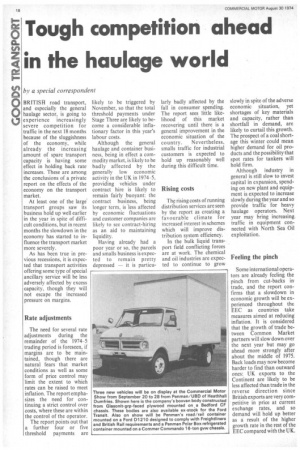Tough competition ahead in the haulage world
Page 20

If you've noticed an error in this article please click here to report it so we can fix it.
by a special correspondent
BRITISH road transport, and especially the general haulage sector, is going to experience increasingly severe competition for traffic in the next 18 months because of the sluggishness of the economy, while already the increasing' amount of spare transport capacity is having some effect in holding back rate increases. These are among the conclusions of a private report on the effects of the economy on the transport market.
At least one of the large' transport groups saw its business hold up well earlier in the year in spite of difficult conditions, but in recent months the slowdown in the economy has started to influence the transport market more severely.
As has been true in previous recessions, it is expected that transport activities offering some type of special ancillary service will be less adversely affected by excess capacity, though they will not escape the increased pressure on margins.
Rate adjustments
The need for several rate adjustments during the remainder of the 1974-5 trading period is foreseen, if margins are to be maintained, though there are natural fears that market conditions as well as some form of price control may limit the extent to which rates can be raised to meet inflation. The report emphasizes the need for continuing a strict control over costs, where these are within the control of the operator.
The report points out that a further four or five threshold payments are likely to be triggered by November, so that the total threshold payments under Stage Three are likely to become a considerable inflationary factor in this year's labour costs.
Although the general haulage and container business, being in effect a commodity market, is likely to be badly affected by the generally low economic activity in the UK in 1974-5, providing vehicles under contract hire is likely to remain fairly .buoyant: the contract business, being longer term, is less affected by economic fluctuations and customer companies are likely to see contract-hiring as an aid to maintaining liquidity.
Having already had a poor year or so, the parcels and smalls business is expected to remain pretty depressed — it is particu larly badly affected by the fall in consumer spending. The report sees little likelihood of this market recovering until there is a general improvement in the economic situation of the country. Nevertheless, smalls traffic for industrial customers is expected to hold up reasonably well during this difficult time.
Rising costs
The rising costs of running distribution services are seen by the report as creating a favourable climate for increased interest in schemes which will improve distribution system efficiency.
In the bulk liquid transport field conflicting forces are at work. The chemical and oil industries are expected to continue to grow slowly in spite of the adverse economic situation, yet shortages of key materials and capacity, rather than shortfall in demand, are likely to curtail this growth. The prospect of a coal shortage this winter could mean higher demand for oil products and the possibility that spot rates for tankers will hold firm.
Although industry in general is still slow to invest capital in expansion, spending on new plant and equipment is expected to increase slowly during the year and so provide traffic for heavy haulage operators. Next year may bring increasing. traffic in equipment connected with North Sea Oil exploitation.
Feeling the pinch
Some international operators are already feeling the pinch from cut-backs in trade, and the report confirms that a slowdown in economic growth will be experienced throughout the EEC as countries take measures aimed at reducing inflation. It is considered that the growth of trade between Common Market partners will slow down over the next year but may go ahead more strongly after about the middle of 1975. Back loads may now become harder to find than outward ones: UK exports to the Continent are likely to be less affected than trade in the reverse direction since British exports are very competitive in price at current exchange rates, and so demand will hold up better as a result of the higher growth rate in the rest of the EEC compared with the UK.




































































































